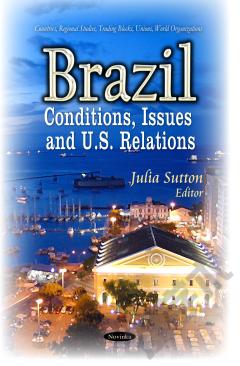South America: Background, U.S. Relations and Issues for Congress
The reports that make up this book examine South American issues that impact on the United States. Chapter 1 provides background on the political and economic situation in Argentina and U.S.-Argentine relations. A key U.S. ally in the Latin American region, Colombia endured an internal armed conflict for half a century. In the late 1990s, the Colombian government devised a new security strategy, known as Plan Colombia, to counter the insurgencies. Originally designed as a 6-year program, Plan Colombia ultimately became a 17-year U.S.-Colombian bilateral effort as described in chapter 2. The U.S.-Colombia Trade Promotion Agreement entered into force on May 15, 2012. Chapter 3 summarizes several key provisions in the original agreement text. Chapter 4 examines how Colombia’s drug policies have evolved in light of Colombia’s peace agreement with the FARC and its changing counternarcotics policy. It explores both policy and oversight concerns, such as: prospects for reducing coca and poppy cultivation under Colombia’s new drug policy and the peace accord with the FARC; the role of Colombian drug trafficking organizations, including powerful criminal groups containing former paramilitaries, in a post-peace accord environment; U.S.-Colombian cooperation on counternarcotics and Colombia’s future role in regional antidrug efforts; and shifts in U.S. government assistance to support Colombia’s revised drug policy and how Colombia’s new policy converges with traditional U.S. priorities. Chapter 5 examines the political and economic conditions in Ecuador and U.S.-Ecuadorian relations U.S.-Paraguayan relations have been close for decades. The U.S. government has provided development assistance to Paraguay, and the two governments have collaborated on security, counternarcotics, and efforts to promote and strengthen democracy, as reported in chapter 6. The United States historically had close relations with Venezuela, a major U.S. oil supplier, but relations have deteriorated under the Chávez and Maduro governments. Chapter 7 provides information on U.S. concerns about the deterioration of human rights and democracy in Venezuela and the lack of bilateral cooperation on counternarcotics and counterterrorism efforts. Chapter 8 analyzes the economic crisis in Venezuela, arguably the most acute crisis in the global economy today, including the causes, policy responses by the government, and recent developments. The chapter also examines how the crisis affects U.S. economic interests. Chapter9 provides background on political and economic developments in Venezuela, U.S. policy, and U.S. legislative action and initiatives from 2013 to 2016 covering the 113th and 114th Congresses.
{{comment.content}}








 京公网安备 11010802027623号
京公网安备 11010802027623号